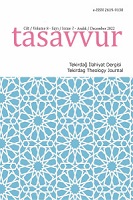Hanefî Hukuk Düşüncesinde Bâtıl veya Fâsid Satım Akdinden Sonra Gerçekleşen Teâtînin Hukuki Mahiyeti
The Legal Nature of The Ta‘ātī Took Place After The Void/Bāṭil and Invalid/Fāsid Sales Contract in Ḥanafī Legal Thought
Author(s): Ünal YERLİKAYASubject(s): History of Islam, Contemporary Islamic Thought, Sociology of Religion, Sociology of Law, Sharia Law
Published by: Tekirdağ Namık Kemal Üniversitesi İlahiyat Fakültesi
Keywords: Islamic Law; Ḥanafī Legal Thought, Ta‘ātī; Void Sales Contract; Invalid Sales Contract;
Summary/Abstract: In Ḥanafī legal thought, ta‘ātī (mutual delivery of goods and price) has been seen as a sales contract without the need for an additional legal transaction. This situation raises the question of whether the delivery transaction took place after a void (bāṭil) or invalid (fāsid) sales contract can be considered as a new contract that is revealed through ta‘ātī. In this study, which we aim to answer the aforementioned question, first of all, the issue of what kind of relationship is established between the definition of the sales contract and the legitimacy of the ta‘ātī is discussed. Secondly, the relationship between the principles of “When something is void, what is implicit in that thing is also void.”, “What builds on what is invalid is also invalid” and the delivery transaction that took place after a void or invalid contract is discussed. Thirdly, it has been discussed whether the acceptance of the delivery transaction after a void or invalid contract as a new contract is dependent on the fact that the first contract has been legally terminated. In Ḥanafī thought two approaches have emerged regarding the relationship between ta‘ātī and void or invalid contract. According to Ḥanafī jurists based on the above-mentioned two principles, the delivery transaction that took place after a void or invalid contract is not a new contract. The fact that the delivery transaction becomes a new contract depends on the fact that the first contract was terminated in a legal way. In the approach of Ḥalvānī and Kāsānī, the fact that the delivery transaction that took place after a void or invalid contract gains the quality of a new contract is not dependent on the fact that the first contract is legally terminated. This approach is very important in terms of making it possible for the idea that “Delivery that took place after a void or invalid contract has the quality of a new contract.” to attribute the classical Ḥanafī thought.
Journal: Tasavvur Tekirdağ İlahiyat Dergisi
- Issue Year: 8/2022
- Issue No: 2
- Page Range: 1095-1121
- Page Count: 27
- Language: Turkish

